MBA7000: Pfizer's Dietary Supplement Industry Analysis Report
VerifiedAdded on 2022/08/24
|8
|1316
|23
Report
AI Summary
This report offers a comprehensive analysis of the dietary supplement industry, specifically focusing on Pfizer's position within it. It begins with an external analysis, detailing industry economic features such as market size, growth rate, and key trends, including the increasing health consciousness of consumers and the rising prevalence of chronic diseases. The analysis identifies competitive forces like consumer attitudes and awareness, as well as key success factors such as meeting unmet consumer needs, effective communication of benefits, and lifestyle fit. The report also examines the nature of competition, highlighting the oligopolistic structure of the market and the relative positions of Pfizer's rivals, including Novartis, GSK, and Johnson & Johnson. An external analysis summary reveals the industry's attractiveness and growth potential. The report also provides references to support the analysis. The report concludes that the market is profitable and has much scope for further growth. The study also explores the factors that are driving the market and their impact on the revenue of big pharmaceutical brands.
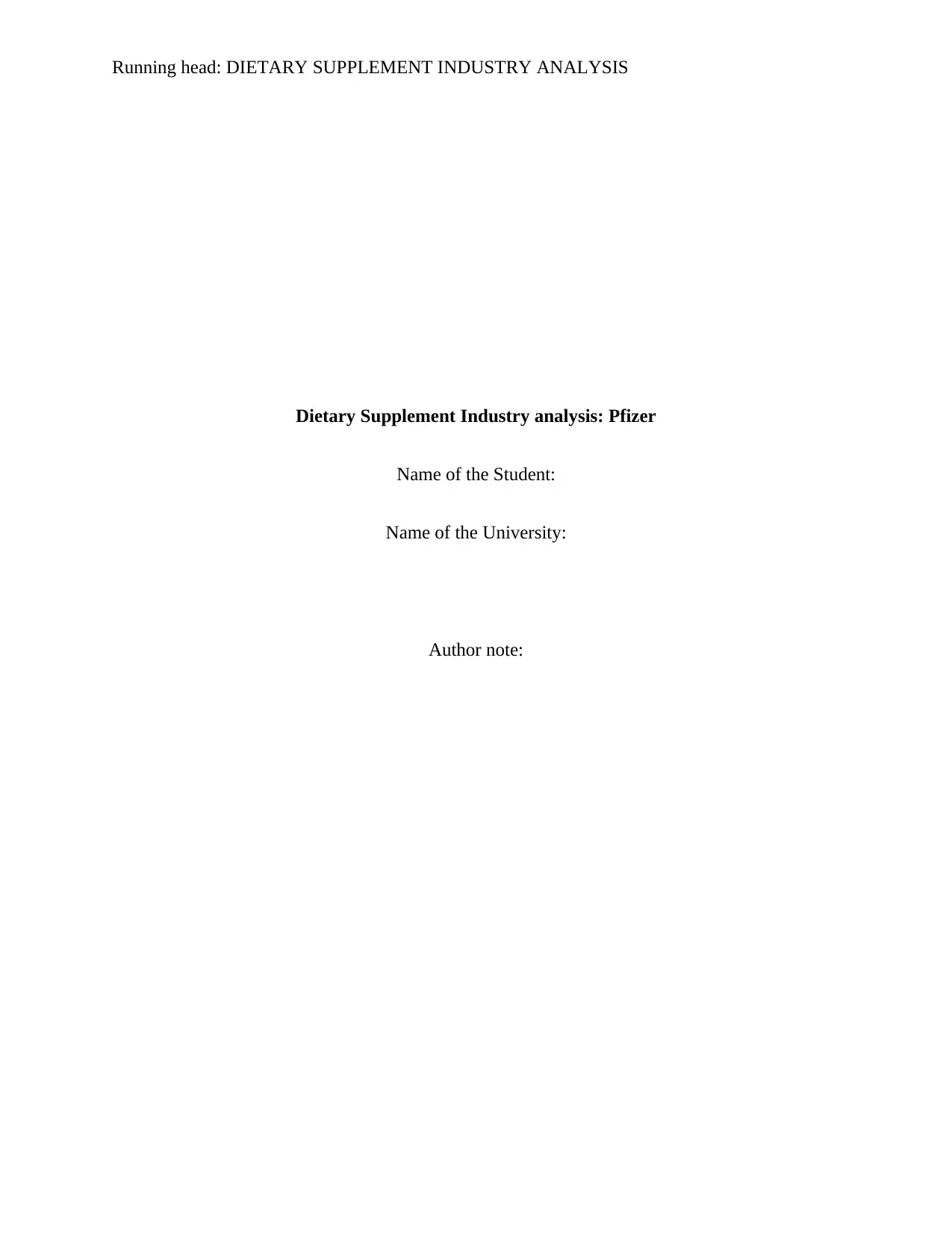
Running head: DIETARY SUPPLEMENT INDUSTRY ANALYSIS
Dietary Supplement Industry analysis: Pfizer
Name of the Student:
Name of the University:
Author note:
Dietary Supplement Industry analysis: Pfizer
Name of the Student:
Name of the University:
Author note:
Paraphrase This Document
Need a fresh take? Get an instant paraphrase of this document with our AI Paraphraser
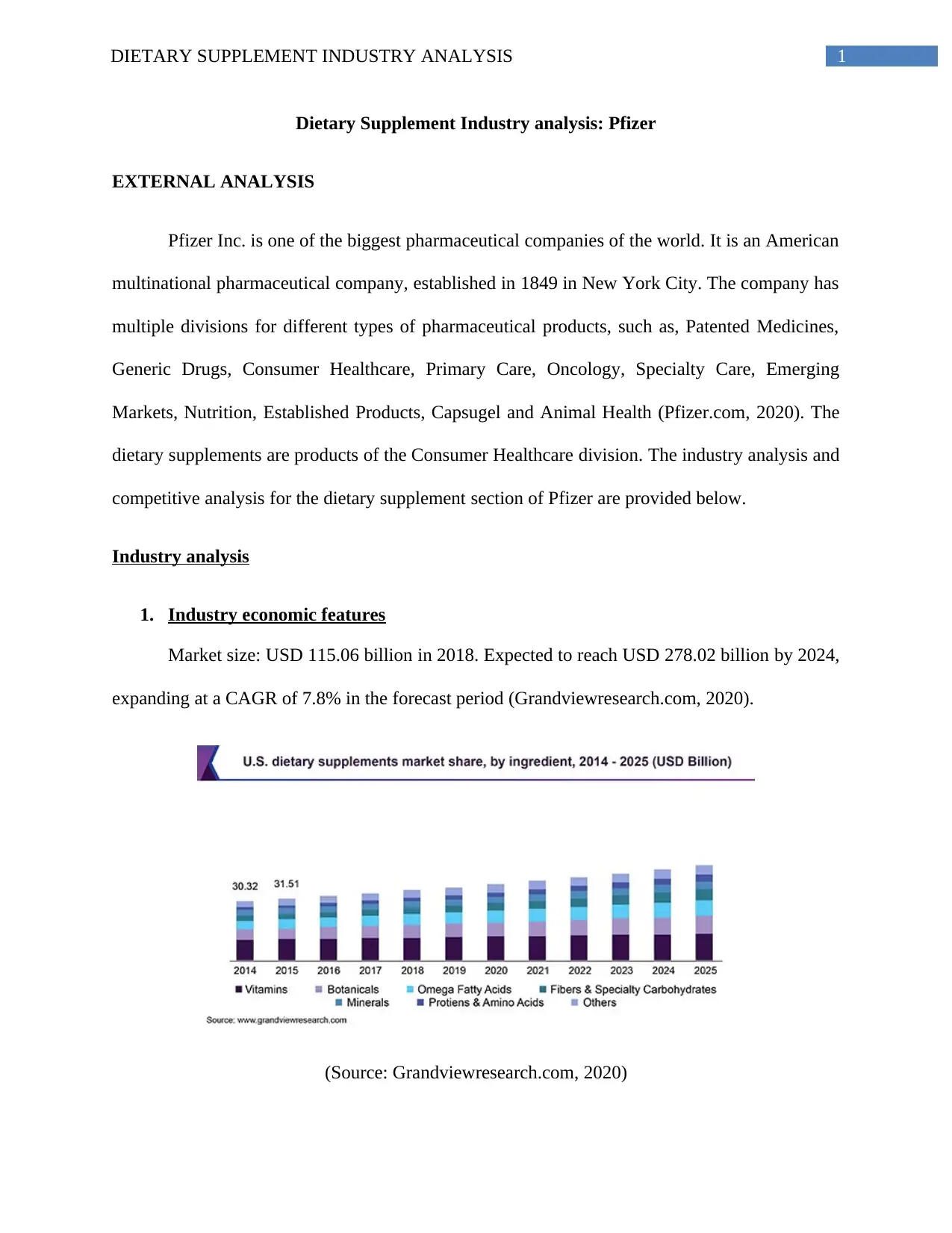
1DIETARY SUPPLEMENT INDUSTRY ANALYSIS
Dietary Supplement Industry analysis: Pfizer
EXTERNAL ANALYSIS
Pfizer Inc. is one of the biggest pharmaceutical companies of the world. It is an American
multinational pharmaceutical company, established in 1849 in New York City. The company has
multiple divisions for different types of pharmaceutical products, such as, Patented Medicines,
Generic Drugs, Consumer Healthcare, Primary Care, Oncology, Specialty Care, Emerging
Markets, Nutrition, Established Products, Capsugel and Animal Health (Pfizer.com, 2020). The
dietary supplements are products of the Consumer Healthcare division. The industry analysis and
competitive analysis for the dietary supplement section of Pfizer are provided below.
Industry analysis
1. Industry economic features
Market size: USD 115.06 billion in 2018. Expected to reach USD 278.02 billion by 2024,
expanding at a CAGR of 7.8% in the forecast period (Grandviewresearch.com, 2020).
(Source: Grandviewresearch.com, 2020)
Dietary Supplement Industry analysis: Pfizer
EXTERNAL ANALYSIS
Pfizer Inc. is one of the biggest pharmaceutical companies of the world. It is an American
multinational pharmaceutical company, established in 1849 in New York City. The company has
multiple divisions for different types of pharmaceutical products, such as, Patented Medicines,
Generic Drugs, Consumer Healthcare, Primary Care, Oncology, Specialty Care, Emerging
Markets, Nutrition, Established Products, Capsugel and Animal Health (Pfizer.com, 2020). The
dietary supplements are products of the Consumer Healthcare division. The industry analysis and
competitive analysis for the dietary supplement section of Pfizer are provided below.
Industry analysis
1. Industry economic features
Market size: USD 115.06 billion in 2018. Expected to reach USD 278.02 billion by 2024,
expanding at a CAGR of 7.8% in the forecast period (Grandviewresearch.com, 2020).
(Source: Grandviewresearch.com, 2020)
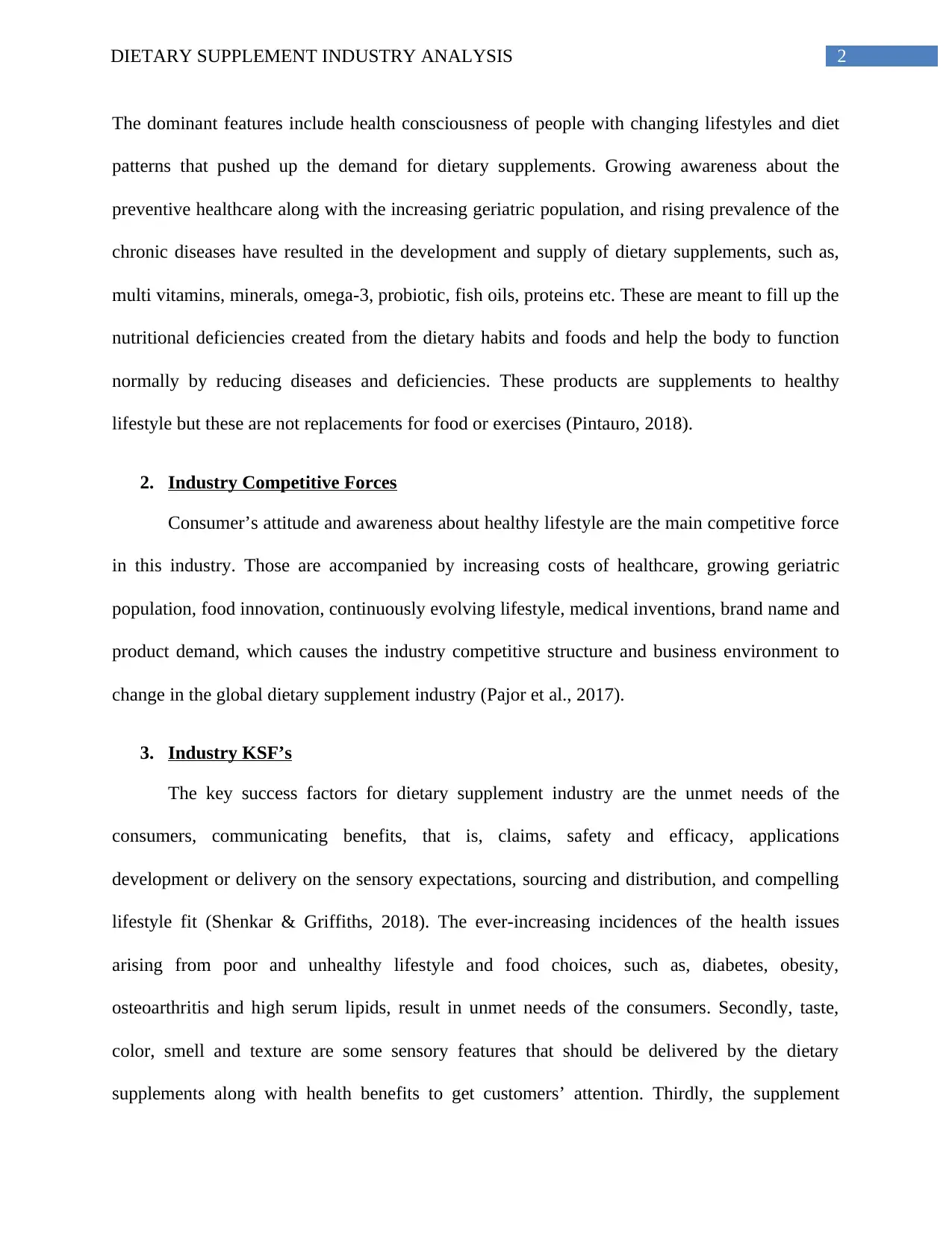
2DIETARY SUPPLEMENT INDUSTRY ANALYSIS
The dominant features include health consciousness of people with changing lifestyles and diet
patterns that pushed up the demand for dietary supplements. Growing awareness about the
preventive healthcare along with the increasing geriatric population, and rising prevalence of the
chronic diseases have resulted in the development and supply of dietary supplements, such as,
multi vitamins, minerals, omega-3, probiotic, fish oils, proteins etc. These are meant to fill up the
nutritional deficiencies created from the dietary habits and foods and help the body to function
normally by reducing diseases and deficiencies. These products are supplements to healthy
lifestyle but these are not replacements for food or exercises (Pintauro, 2018).
2. Industry Competitive Forces
Consumer’s attitude and awareness about healthy lifestyle are the main competitive force
in this industry. Those are accompanied by increasing costs of healthcare, growing geriatric
population, food innovation, continuously evolving lifestyle, medical inventions, brand name and
product demand, which causes the industry competitive structure and business environment to
change in the global dietary supplement industry (Pajor et al., 2017).
3. Industry KSF’s
The key success factors for dietary supplement industry are the unmet needs of the
consumers, communicating benefits, that is, claims, safety and efficacy, applications
development or delivery on the sensory expectations, sourcing and distribution, and compelling
lifestyle fit (Shenkar & Griffiths, 2018). The ever-increasing incidences of the health issues
arising from poor and unhealthy lifestyle and food choices, such as, diabetes, obesity,
osteoarthritis and high serum lipids, result in unmet needs of the consumers. Secondly, taste,
color, smell and texture are some sensory features that should be delivered by the dietary
supplements along with health benefits to get customers’ attention. Thirdly, the supplement
The dominant features include health consciousness of people with changing lifestyles and diet
patterns that pushed up the demand for dietary supplements. Growing awareness about the
preventive healthcare along with the increasing geriatric population, and rising prevalence of the
chronic diseases have resulted in the development and supply of dietary supplements, such as,
multi vitamins, minerals, omega-3, probiotic, fish oils, proteins etc. These are meant to fill up the
nutritional deficiencies created from the dietary habits and foods and help the body to function
normally by reducing diseases and deficiencies. These products are supplements to healthy
lifestyle but these are not replacements for food or exercises (Pintauro, 2018).
2. Industry Competitive Forces
Consumer’s attitude and awareness about healthy lifestyle are the main competitive force
in this industry. Those are accompanied by increasing costs of healthcare, growing geriatric
population, food innovation, continuously evolving lifestyle, medical inventions, brand name and
product demand, which causes the industry competitive structure and business environment to
change in the global dietary supplement industry (Pajor et al., 2017).
3. Industry KSF’s
The key success factors for dietary supplement industry are the unmet needs of the
consumers, communicating benefits, that is, claims, safety and efficacy, applications
development or delivery on the sensory expectations, sourcing and distribution, and compelling
lifestyle fit (Shenkar & Griffiths, 2018). The ever-increasing incidences of the health issues
arising from poor and unhealthy lifestyle and food choices, such as, diabetes, obesity,
osteoarthritis and high serum lipids, result in unmet needs of the consumers. Secondly, taste,
color, smell and texture are some sensory features that should be delivered by the dietary
supplements along with health benefits to get customers’ attention. Thirdly, the supplement
⊘ This is a preview!⊘
Do you want full access?
Subscribe today to unlock all pages.

Trusted by 1+ million students worldwide
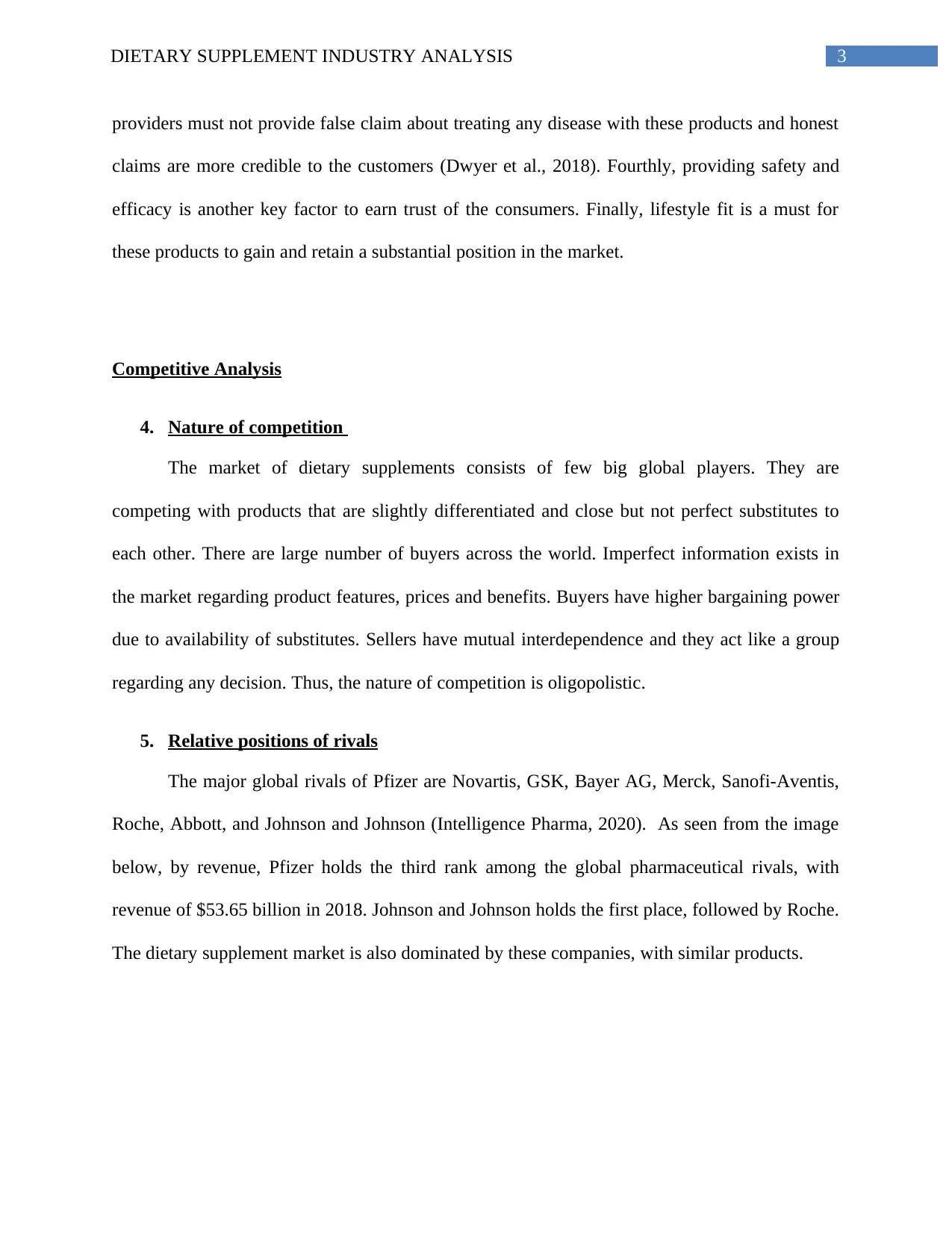
3DIETARY SUPPLEMENT INDUSTRY ANALYSIS
providers must not provide false claim about treating any disease with these products and honest
claims are more credible to the customers (Dwyer et al., 2018). Fourthly, providing safety and
efficacy is another key factor to earn trust of the consumers. Finally, lifestyle fit is a must for
these products to gain and retain a substantial position in the market.
Competitive Analysis
4. Nature of competition
The market of dietary supplements consists of few big global players. They are
competing with products that are slightly differentiated and close but not perfect substitutes to
each other. There are large number of buyers across the world. Imperfect information exists in
the market regarding product features, prices and benefits. Buyers have higher bargaining power
due to availability of substitutes. Sellers have mutual interdependence and they act like a group
regarding any decision. Thus, the nature of competition is oligopolistic.
5. Relative positions of rivals
The major global rivals of Pfizer are Novartis, GSK, Bayer AG, Merck, Sanofi-Aventis,
Roche, Abbott, and Johnson and Johnson (Intelligence Pharma, 2020). As seen from the image
below, by revenue, Pfizer holds the third rank among the global pharmaceutical rivals, with
revenue of $53.65 billion in 2018. Johnson and Johnson holds the first place, followed by Roche.
The dietary supplement market is also dominated by these companies, with similar products.
providers must not provide false claim about treating any disease with these products and honest
claims are more credible to the customers (Dwyer et al., 2018). Fourthly, providing safety and
efficacy is another key factor to earn trust of the consumers. Finally, lifestyle fit is a must for
these products to gain and retain a substantial position in the market.
Competitive Analysis
4. Nature of competition
The market of dietary supplements consists of few big global players. They are
competing with products that are slightly differentiated and close but not perfect substitutes to
each other. There are large number of buyers across the world. Imperfect information exists in
the market regarding product features, prices and benefits. Buyers have higher bargaining power
due to availability of substitutes. Sellers have mutual interdependence and they act like a group
regarding any decision. Thus, the nature of competition is oligopolistic.
5. Relative positions of rivals
The major global rivals of Pfizer are Novartis, GSK, Bayer AG, Merck, Sanofi-Aventis,
Roche, Abbott, and Johnson and Johnson (Intelligence Pharma, 2020). As seen from the image
below, by revenue, Pfizer holds the third rank among the global pharmaceutical rivals, with
revenue of $53.65 billion in 2018. Johnson and Johnson holds the first place, followed by Roche.
The dietary supplement market is also dominated by these companies, with similar products.
Paraphrase This Document
Need a fresh take? Get an instant paraphrase of this document with our AI Paraphraser
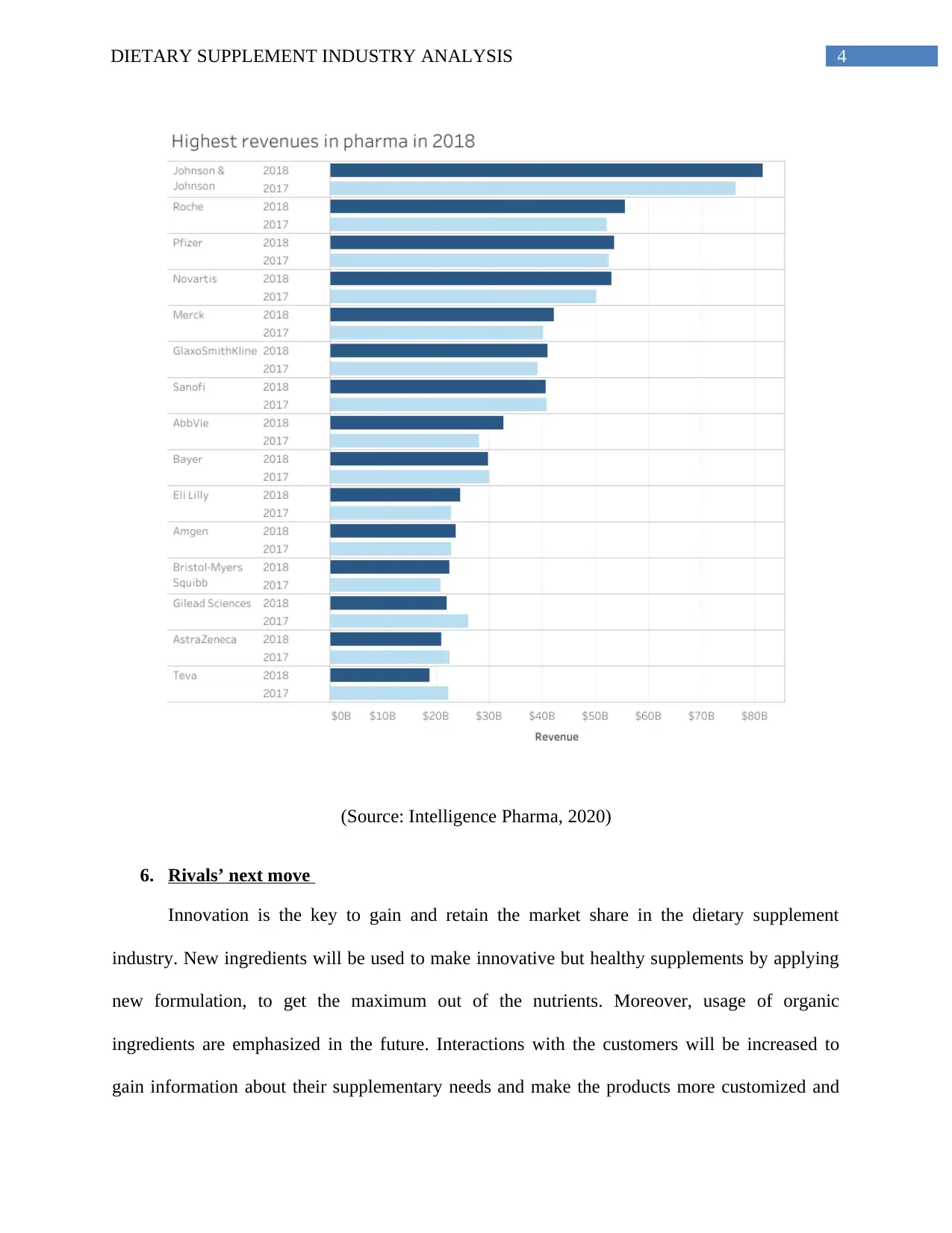
4DIETARY SUPPLEMENT INDUSTRY ANALYSIS
(Source: Intelligence Pharma, 2020)
6. Rivals’ next move
Innovation is the key to gain and retain the market share in the dietary supplement
industry. New ingredients will be used to make innovative but healthy supplements by applying
new formulation, to get the maximum out of the nutrients. Moreover, usage of organic
ingredients are emphasized in the future. Interactions with the customers will be increased to
gain information about their supplementary needs and make the products more customized and
(Source: Intelligence Pharma, 2020)
6. Rivals’ next move
Innovation is the key to gain and retain the market share in the dietary supplement
industry. New ingredients will be used to make innovative but healthy supplements by applying
new formulation, to get the maximum out of the nutrients. Moreover, usage of organic
ingredients are emphasized in the future. Interactions with the customers will be increased to
gain information about their supplementary needs and make the products more customized and
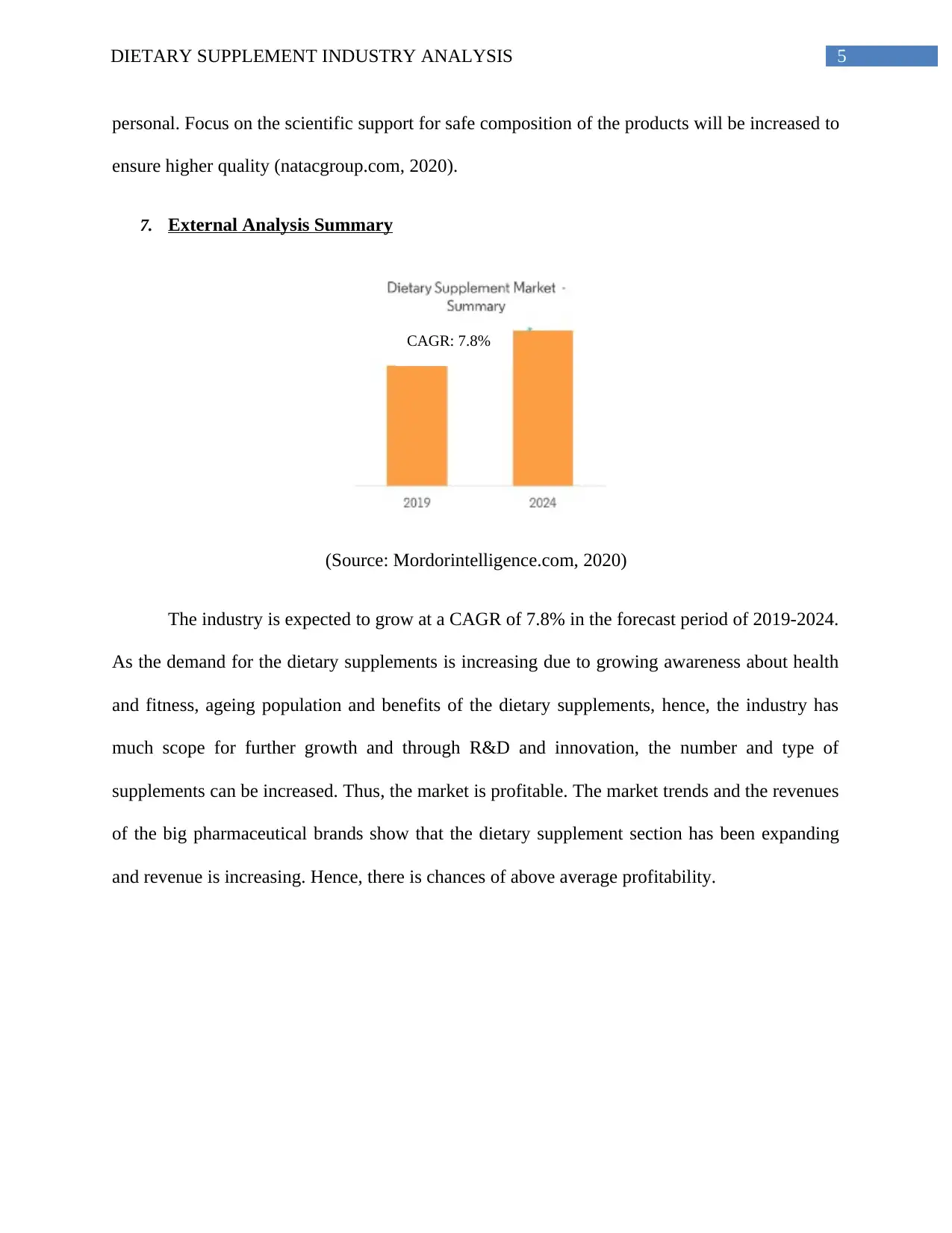
5DIETARY SUPPLEMENT INDUSTRY ANALYSIS
personal. Focus on the scientific support for safe composition of the products will be increased to
ensure higher quality (natacgroup.com, 2020).
7. External Analysis Summary
(Source: Mordorintelligence.com, 2020)
The industry is expected to grow at a CAGR of 7.8% in the forecast period of 2019-2024.
As the demand for the dietary supplements is increasing due to growing awareness about health
and fitness, ageing population and benefits of the dietary supplements, hence, the industry has
much scope for further growth and through R&D and innovation, the number and type of
supplements can be increased. Thus, the market is profitable. The market trends and the revenues
of the big pharmaceutical brands show that the dietary supplement section has been expanding
and revenue is increasing. Hence, there is chances of above average profitability.
CAGR: 7.8%
personal. Focus on the scientific support for safe composition of the products will be increased to
ensure higher quality (natacgroup.com, 2020).
7. External Analysis Summary
(Source: Mordorintelligence.com, 2020)
The industry is expected to grow at a CAGR of 7.8% in the forecast period of 2019-2024.
As the demand for the dietary supplements is increasing due to growing awareness about health
and fitness, ageing population and benefits of the dietary supplements, hence, the industry has
much scope for further growth and through R&D and innovation, the number and type of
supplements can be increased. Thus, the market is profitable. The market trends and the revenues
of the big pharmaceutical brands show that the dietary supplement section has been expanding
and revenue is increasing. Hence, there is chances of above average profitability.
CAGR: 7.8%
⊘ This is a preview!⊘
Do you want full access?
Subscribe today to unlock all pages.

Trusted by 1+ million students worldwide
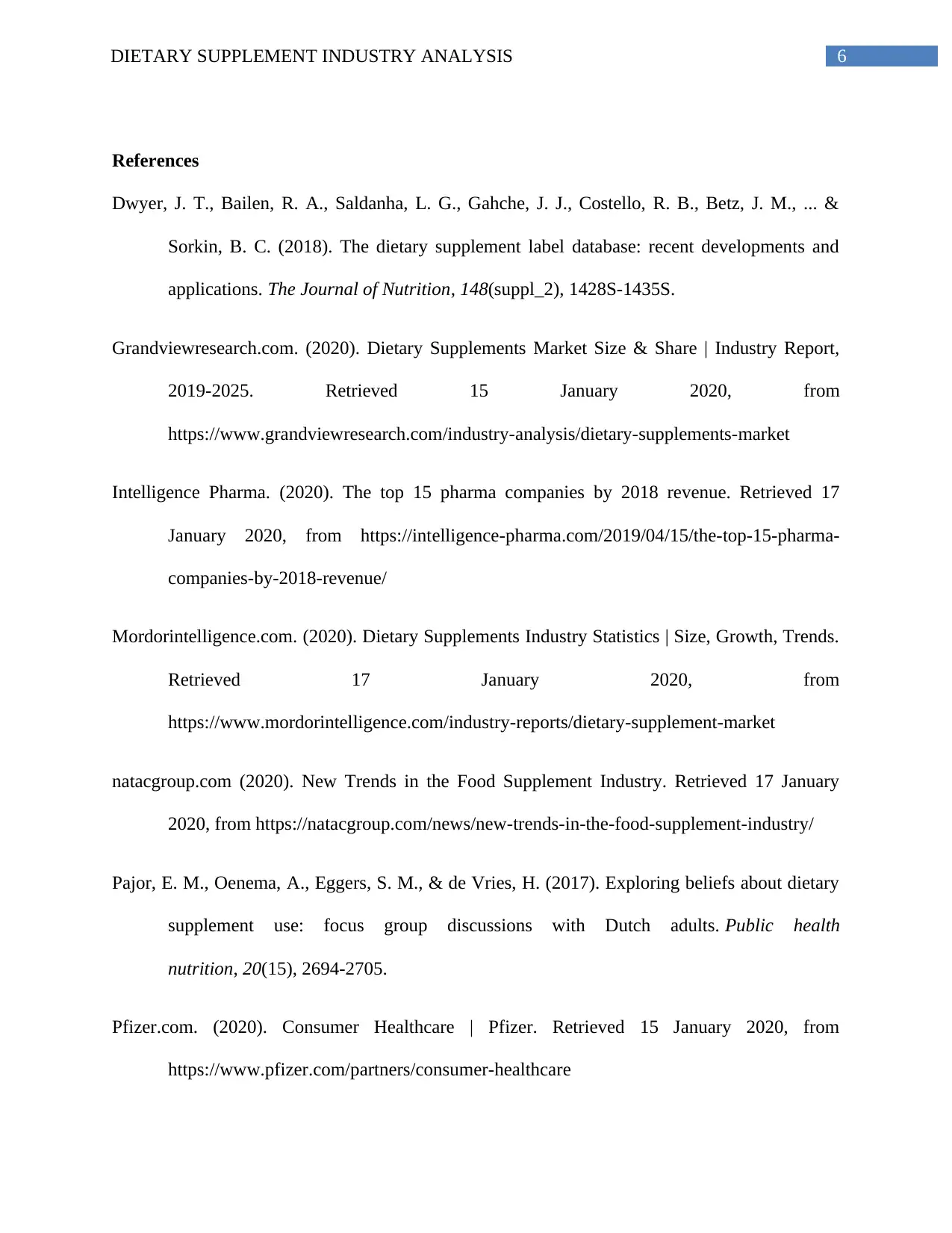
6DIETARY SUPPLEMENT INDUSTRY ANALYSIS
References
Dwyer, J. T., Bailen, R. A., Saldanha, L. G., Gahche, J. J., Costello, R. B., Betz, J. M., ... &
Sorkin, B. C. (2018). The dietary supplement label database: recent developments and
applications. The Journal of Nutrition, 148(suppl_2), 1428S-1435S.
Grandviewresearch.com. (2020). Dietary Supplements Market Size & Share | Industry Report,
2019-2025. Retrieved 15 January 2020, from
https://www.grandviewresearch.com/industry-analysis/dietary-supplements-market
Intelligence Pharma. (2020). The top 15 pharma companies by 2018 revenue. Retrieved 17
January 2020, from https://intelligence-pharma.com/2019/04/15/the-top-15-pharma-
companies-by-2018-revenue/
Mordorintelligence.com. (2020). Dietary Supplements Industry Statistics | Size, Growth, Trends.
Retrieved 17 January 2020, from
https://www.mordorintelligence.com/industry-reports/dietary-supplement-market
natacgroup.com (2020). New Trends in the Food Supplement Industry. Retrieved 17 January
2020, from https://natacgroup.com/news/new-trends-in-the-food-supplement-industry/
Pajor, E. M., Oenema, A., Eggers, S. M., & de Vries, H. (2017). Exploring beliefs about dietary
supplement use: focus group discussions with Dutch adults. Public health
nutrition, 20(15), 2694-2705.
Pfizer.com. (2020). Consumer Healthcare | Pfizer. Retrieved 15 January 2020, from
https://www.pfizer.com/partners/consumer-healthcare
References
Dwyer, J. T., Bailen, R. A., Saldanha, L. G., Gahche, J. J., Costello, R. B., Betz, J. M., ... &
Sorkin, B. C. (2018). The dietary supplement label database: recent developments and
applications. The Journal of Nutrition, 148(suppl_2), 1428S-1435S.
Grandviewresearch.com. (2020). Dietary Supplements Market Size & Share | Industry Report,
2019-2025. Retrieved 15 January 2020, from
https://www.grandviewresearch.com/industry-analysis/dietary-supplements-market
Intelligence Pharma. (2020). The top 15 pharma companies by 2018 revenue. Retrieved 17
January 2020, from https://intelligence-pharma.com/2019/04/15/the-top-15-pharma-
companies-by-2018-revenue/
Mordorintelligence.com. (2020). Dietary Supplements Industry Statistics | Size, Growth, Trends.
Retrieved 17 January 2020, from
https://www.mordorintelligence.com/industry-reports/dietary-supplement-market
natacgroup.com (2020). New Trends in the Food Supplement Industry. Retrieved 17 January
2020, from https://natacgroup.com/news/new-trends-in-the-food-supplement-industry/
Pajor, E. M., Oenema, A., Eggers, S. M., & de Vries, H. (2017). Exploring beliefs about dietary
supplement use: focus group discussions with Dutch adults. Public health
nutrition, 20(15), 2694-2705.
Pfizer.com. (2020). Consumer Healthcare | Pfizer. Retrieved 15 January 2020, from
https://www.pfizer.com/partners/consumer-healthcare
Paraphrase This Document
Need a fresh take? Get an instant paraphrase of this document with our AI Paraphraser
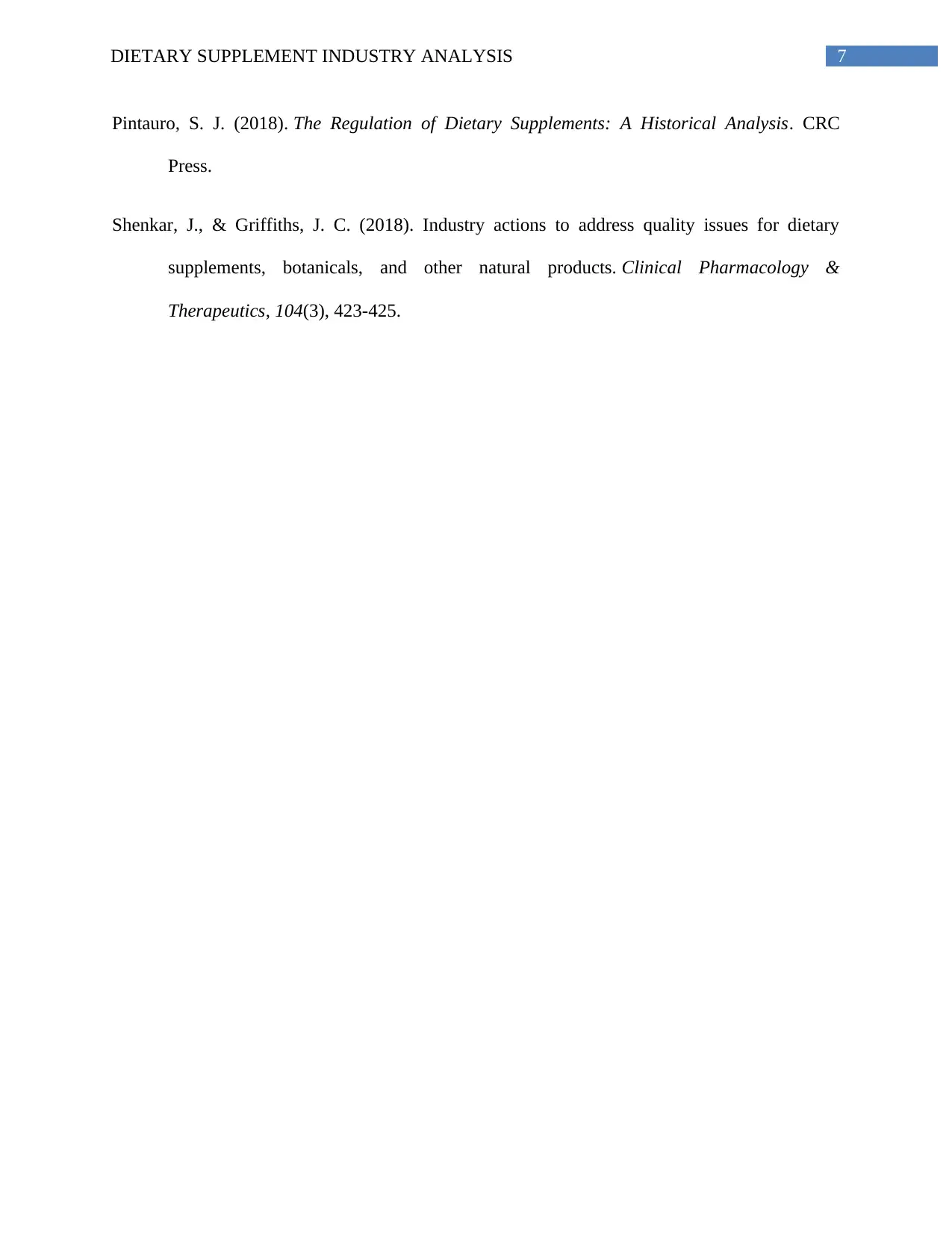
7DIETARY SUPPLEMENT INDUSTRY ANALYSIS
Pintauro, S. J. (2018). The Regulation of Dietary Supplements: A Historical Analysis. CRC
Press.
Shenkar, J., & Griffiths, J. C. (2018). Industry actions to address quality issues for dietary
supplements, botanicals, and other natural products. Clinical Pharmacology &
Therapeutics, 104(3), 423-425.
Pintauro, S. J. (2018). The Regulation of Dietary Supplements: A Historical Analysis. CRC
Press.
Shenkar, J., & Griffiths, J. C. (2018). Industry actions to address quality issues for dietary
supplements, botanicals, and other natural products. Clinical Pharmacology &
Therapeutics, 104(3), 423-425.
1 out of 8
Your All-in-One AI-Powered Toolkit for Academic Success.
+13062052269
info@desklib.com
Available 24*7 on WhatsApp / Email
![[object Object]](/_next/static/media/star-bottom.7253800d.svg)
Unlock your academic potential
Copyright © 2020–2026 A2Z Services. All Rights Reserved. Developed and managed by ZUCOL.

